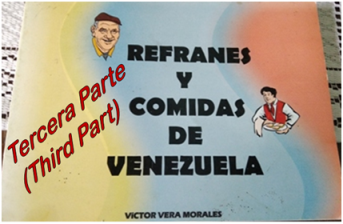En el día de hoy, les ofrezco la tercera parte de “Cinco sabios refranes venezolanos”. Para esta publicación vuelvo a emplear el último libro que escribió mi abuelo, Víctor Vera Morales “El Poeta”; y como siempre, las explicaciones son enteramente de mi autoría.
Today, I offer you the third part of "Five wise Venezuelan sayings." For this publication I am using the last book that my grandfather wrote, Víctor Vera Morales “El Poeta”; and as always, the explanations are entirely my own.

1) “Como caimán en boca de caño.” Un caimán es una especie de cocodrilo propio de los ríos venezolanos, principalmente del Orinoco; y un caño es un brazo secundario de los ríos principales, con un cauce relativamente pequeño. Este dicho es una alegoría a la actitud del caimán cuando está cazando en la entrada de un caño, a la espera de la presa, bien sea animal o humana que se acerque a beber agua; así que al emplear el refrán, se hace referencia a una persona que está oculta o callada, a la expectativa de una oportunidad favorable o idónea a sus intereses.
"Like alligator in the mouth of a pipe." An alligator is a species of crocodile typical of the Venezuelan rivers, mainly the Orinoco; and a pipe (caño) is a secondary branch of the main rivers, with a relatively small channel. This saying is an allegory to the attitude of the alligator when it is hunting at the entrance of a pipe, waiting for the prey, whether animal or human, who comes to drink water; so when using the proverb, it refers to a person who is hidden or quiet, in the expectation of a favorable or suitable opportunity for their interests.
 2) “Cada oveja con su pareja.” Un refrán de uso mundial, que indica que cada persona debe andar con sus semejantes, con aquellos que comparten sus mismos intereses, forma de pensar e intereses y costumbres.
2) “Cada oveja con su pareja.” Un refrán de uso mundial, que indica que cada persona debe andar con sus semejantes, con aquellos que comparten sus mismos intereses, forma de pensar e intereses y costumbres.
"Each sheep whit its couple." A saying of world use, which indicates that each person should walk with their peers, with those who share the same interests, way of thinking and interests and customs.
 3) “Sacar las castañas del fuego.” Para consumir las castañas, primero hay que tostarlas poniéndolas al fuego y luego sacarlas, y esto último por lo general es una labor difícil y engorrosa porque quien lo hace se puede quemar; no obstante, echarlas al fuego y comerlas no tiene dificultad alguna. Este refrán se aplica cuando a una persona le encanta meterse en líos y compromisos, para que después venga otro y le resuelva el problema. Por tanto este dicho sirve para señalar a alguien quien es un aprovechador.
3) “Sacar las castañas del fuego.” Para consumir las castañas, primero hay que tostarlas poniéndolas al fuego y luego sacarlas, y esto último por lo general es una labor difícil y engorrosa porque quien lo hace se puede quemar; no obstante, echarlas al fuego y comerlas no tiene dificultad alguna. Este refrán se aplica cuando a una persona le encanta meterse en líos y compromisos, para que después venga otro y le resuelva el problema. Por tanto este dicho sirve para señalar a alguien quien es un aprovechador.
"Take the chestnuts out of the fire." To consume chestnuts, first you have to toast them by putting them on the fire and then taking them out, and the latter is usually a difficult and cumbersome task because whoever does it can get burned; however, throwing them into the fire and eating them has no difficulty. This saying applies when a person loves to get into trouble and compromises, so that later someone else will come and solve the problem. Therefore this saying serves to indicate someone who is a profiteer.
 4) “Es más feo que una pelea a machete.” Un machete es una herramienta, pero también un arma blanca que se utiliza en las labores del campo. Era frecuente que los campesinos resolvieran los problemas peleándose con machetes, lo cual resultaba un pleito muy feo y sangriento. De allí que este refrán se utilice para decir que alguien o algo carecen de belleza, o sea, es muy, muy, muy feo.
4) “Es más feo que una pelea a machete.” Un machete es una herramienta, pero también un arma blanca que se utiliza en las labores del campo. Era frecuente que los campesinos resolvieran los problemas peleándose con machetes, lo cual resultaba un pleito muy feo y sangriento. De allí que este refrán se utilice para decir que alguien o algo carecen de belleza, o sea, es muy, muy, muy feo.
"It's uglier than a machete fight." A machete is a tool, but also a knife that is used in field work. Peasants often solved problems by fighting with machetes, which was a very ugly and bloody fight. Hence, this saying is used to say that someone or something lacks beauty, that is, it is very, very, very ugly.
 5) “Ni chicha ni limonada.” Dicho que se aplica a aquellas personas que son ambiguas, indecisas, que no tienen un criterio definido, o que simplemente por no comprometerse, no asumen una posición firme en ciertas circunstancias. Es un refrán que tiene una carga despectiva.
5) “Ni chicha ni limonada.” Dicho que se aplica a aquellas personas que son ambiguas, indecisas, que no tienen un criterio definido, o que simplemente por no comprometerse, no asumen una posición firme en ciertas circunstancias. Es un refrán que tiene una carga despectiva.
"Neither chicha nor lemonade." Said it applies to those people who are ambiguous, undecided, who do not have a defined criterion, or who simply by not committing themselves, do not assume a firm position in certain circumstances. It is a saying that has a derogatory charge.
 Queridos lectores, seguidamente coloco los links de la primera y segunda entregas, por si las quieren leer:
Queridos lectores, seguidamente coloco los links de la primera y segunda entregas, por si las quieren leer:
Dear readers, below I place the links of the first and second installments, in case you want to read them:
 Fuentes Bibliográficas / Bibliographical sources:
Fuentes Bibliográficas / Bibliographical sources:
Víctor Vera Morales. (Agosto 2004). Refranes y Comidas de Venezuela. Editado por el Instituto Municipal de Publicaciones de la Alcaldía de Caracas.
Fuentes de las imágenes / Image sources:
Foto de mi autoría, tomada con un teléfono REDMI 8A, intervenida con WordArt / Photo of my authorship, taken with a REDMI 8A telephone, intervened with WordArt.
Los diseños incluidos en esta publicación, han sido elaborados por mi persona con la aplicación CANVA / The designs included in this publication has been made by me with the CANVA application.
En caso de que se requiera emplear el contenido o imágenes de este post y de mis otras publicaciones, agradecería se hiciera referencia a mi autoría (Fabiola Martínez Morales) y se citara el link correspondiente. Gracias.
In the event that it is required to use the content or images of this post and my other publications, I would be grateful if my authorship (Fabiola Martínez Morales) was made and the corresponding link was cited. Thank you.
.png)








.png)

Excelente, me encanta que des a conocer o recordar estos refranes que forman parte de nosotros como venezolanos
Es muy importante @actioncats que como el pueblo venezolano que somo (sin importar si estamos en el país o fuera de él), siempre conozcamos y recordemos nuestras costumbres, y los dichos son parte de ellas. Es precisamente esto lo que trato de hacer al publicar sobre refranes. Me alegra mucho que leas mi trabajo y sepas cuál es mi interés principal. Un gran abrazo.
muy interesante! el de las castañas creo que no lo habia oido, gracias por explicarlo, lo tendre en cuenta en mi repertorio jeje. saludos
Me encanta que te haya parecido interesante. Ya está disponible la cuarta entrega de refranes. Allí también hay otros bien particulares. Gracias por leer mi post. Saludos.
¡Felicidades! Esta publicación obtuvo upvote y fue compartido por @la-colmena, un proyecto de Curación Manual para la comunidad hispana de Hive que cuenta con el respaldo de @curie.
Si te gusta el trabajo que hacemos, te invitamos a darle tu voto a este comentario y a votar como testigo por Curie.
Si quieres saber más sobre nuestro proyecto, acompáñanos en Discord: La Colmena.
Congratulations @sirenahippie! You have completed the following achievement on the Hive blockchain and have been rewarded with new badge(s) :
You can view your badges on your board And compare to others on the Ranking
If you no longer want to receive notifications, reply to this comment with the word
STOPDo not miss the last post from @hivebuzz:
Gracias por compartir tu contenido con la comunidad de El Arca (@elarca), el mismo ha sido votado por nuestra iniciativa de curación artística @stellae. Si deseas puedes delegar HP al proyecto: Delegate 25 HP Delegate 50 HP Delegate 100 HP Delegate 250HP Delegate 500HP
Sí, todos muy acertados!